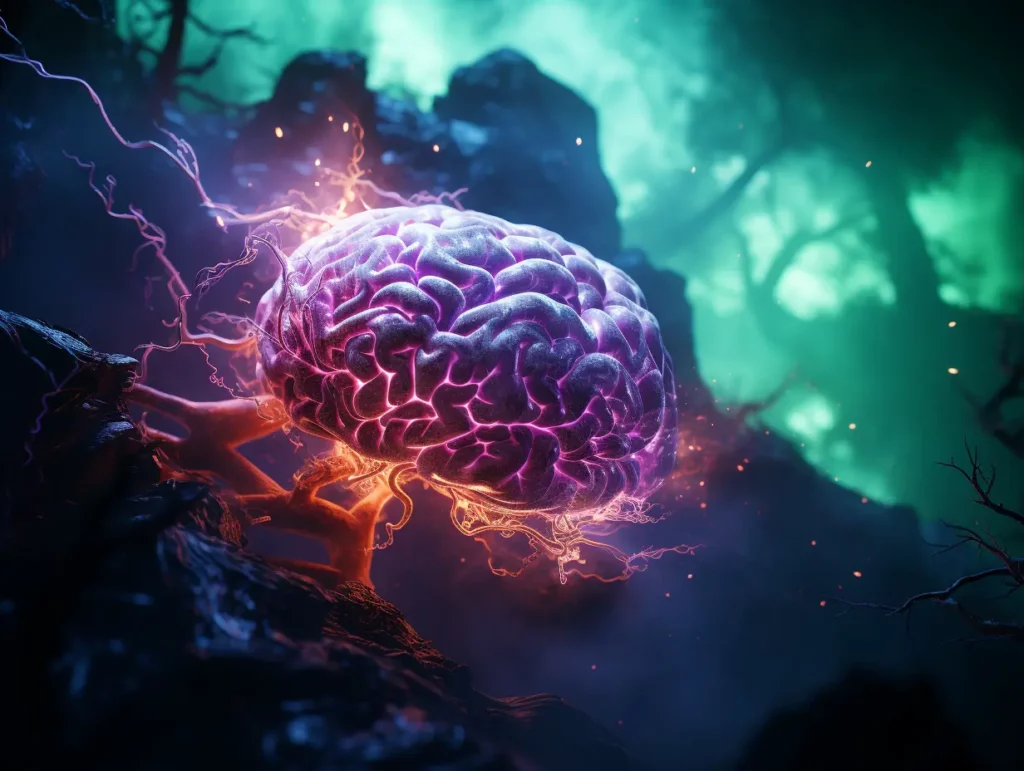Ketamine Therapy for Depression and Anxiety: A New Approach
Ketamine Therapy for Depression and Anxiety
Ever feel like you’re lost in a fog, with no sign of the sun? That’s how mood disorders can feel. But what if there was a beacon piercing through that gloom? Welcome to an exploration into ketamine therapy for depression and anxiety.

You’ve probably heard about it. It’s been called groundbreaking, even life-changing by some.
In this piece, we’ll cut through the hype. We will delve into why ketamine therapy for depression and anxiety works differently than other treatments and explore its potential benefits.
We also shine a light on how Chrysalis Ketamine offers personalized care to each patient, adding another layer of support during their journey out of darkness.
Sounds intriguing? Let’s dive right in!
Table of Contents
Understanding Ketamine Therapy for Depression and Anxiety
If you’ve been battling with depression or anxiety, especially major depression, treatment-resistant depression or treatment-resistant anxiety types, there’s a good chance that traditional antidepressant treatments may not be enough. But don’t lose hope yet; this is where ketamine therapy comes in.
Ketamine therapy for depression and anxiety offers a different approach to managing mental health disorders.

Unlike other therapies which often take weeks to start showing effects, the impact of ketamine infusions can be felt much faster – often within hours after administration.
This novel treatment option has gained attention because it helps some people who have found little relief from other treatments. A significant proportion of patients do not respond to traditional antidepressant treatments—making them candidates for alternative approaches like ketamine infusion therapy.
The Basics of Ketamine Infusion Treatment
Let’s demystify what exactly happens during a typical session. First off, ketamine is administered under close supervision by medical professionals trained in their use and monitoring potential side effects.
Have you ever wondered how ketamine treatments work? Well, the exact mechanism isn’t fully understood but it’s thought that ketamine helps promote new connections between brain cells—a process known as synaptogenesis—that aids in mood regulation and cognitive function.
Remember folks. We’re talking about supervised medical application here—not recreational misuse which can lead to serious harm.
Ketamine IV Therapy
Ketamine IV Therapy
The Science Behind Ketamine's Antidepressant Effects
Ever wonder why ketamine, often associated with anesthesia, can also lift the heavy clouds of depression? It all starts in your brain. Ketamine infusion, contrary to traditional antidepressants, acts rapidly and targets a different part of our neural circuitry.
Unraveling the Role of the NMDA Receptor
Ketamine works its magic by blocking what’s called an NMDA receptor. These NMDA receptors are found in abundance in the brain and have a critical role to play in keeping normal neurological activity.
When these receptors are blocked by ketamine, it triggers a cascade of reactions within neurons. This chain of events results in a heightened production of BDNF (Brain-Derived Neurotrophic Factor), which encourages neuron growth and interconnectivity – something that is deficient in individuals experiencing major depression.
This is where things get intriguing: while most antidepressants take weeks or even months to start working, ketamine shows its rapid antidepressant effects. Patients have reported feeling better as soon as hours after treatment. And here’s another thing you may not know: those rapid results don’t come at the cost of efficacy. According to research studies on this topic; 69% felt long-term relief after just one infusion session.
Feeling clouded by depression? #Ketamine therapy might just be the silver lining you're looking for. It acts fast, targeting the brain's NMDA receptors to spark neuron growth. Plus, 69% reported long-term relief after a single session.
Chrysalis Ketamine Tweet

Personalized Care and Attention at Chrysalis Ketamine
At Chrysalis Ketamine, we pride ourselves on delivering personalized care to each patient. Our individualized approach to ketamine therapy isn’t generic; we design plans that are specifically tailored to each person’s particular needs.
This dedication to personalization is born from the understanding that no two people experience depression or anxiety in the same way. As such, treatment should reflect this diversity of experiences. It’s not just about administering a dose of ketamine; it’s about building a supportive relationship with patients and adjusting treatments as necessary for optimal results.
The success stories speak volumes: patients often report feeling more heard and cared for here than they have at other clinics. This empathetic environment combined with cutting-edge medical knowledge creates an effective path toward improved mental health.
Feeling clouded by depression? #Ketamine therapy might just be the silver lining you're looking for. It acts fast, targeting the brain's NMDA receptors to spark neuron growth. Plus, 69% reported long-term relief after a single session.
Chrysalis Ketamine Tweet

Exploring Alternative Practices for Coping with Depression and Anxiety
Living in Conejo Valley, Calabasas, Newbury Park, Westlake Park, Malibu, Thousand Oaks, Agoura Hills, and other cities in the area provides residents access to a variety of activities that can complement ketamine therapy. These alternatives aren’t replacements, but they provide extra help when coping with depression and anxiety.
Activities to Boost Mental Health in Newbury Park
Taking care of your mental health goes beyond therapy sessions; it’s about creating an environment conducive to healing. Here are some ways you can foster positive mental health:
- Nature Walks: Studies have shown the therapeutic effects of nature on our well-being. The lush parks in the area offer a serene escape from daily stressors.
- Meditation Groups: Meditation has been shown to reduce anxiety levels. Joining local meditation groups not only helps practice mindfulness but also builds community support.
If alternative medicine interests you, consider acupuncture or aromatherapy which could potentially ease symptoms associated with mood disorders. However, always consult your healthcare provider before starting any new treatments alongside ketamine therapy.
Incorporating such practices into your routine might make living with depression or anxiety more manageable, giving you the resilience needed during treatment.
Looking for ways to cope with depression and anxiety in and around Conejo Valley? Complement your ketamine therapy with nature walks, meditation groups, or even acupuncture. Remember: mental health is about more than just treatment sessions. #MentalHealthAwareness
Chrysalis Ketamine Tweet

Ketamine Therapy and its Role in Health Care Delivery
Healthcare delivery has been revolutionized with the introduction of ketamine therapy. Known for its rapid antidepressant effects, it’s reshaping how we treat depression and anxiety.
Ketamine is an NMDA receptor antagonist that functions differently from traditional therapies. Unlike most antidepressants which take weeks to work, ketamine can provide relief within hours.
This fast-acting property makes it a promising solution in healthcare economics as well, offering potential cost savings over long-term treatments. Recent studies show a significant proportion of patients with major depressive disorder not responding to conventional treatments are finding hope in ketamine therapy.
In spite of this progress, challenges remain. Aspects like treatment protocols and administration routes need more research for optimal patient outcomes. The question isn’t whether or not we should use ketamine—it’s about making sure we do so effectively while mitigating risks. More details here.
Revolutionizing health care, ketamine therapy offers quick relief for depression and anxiety unlike traditional treatments. It's not just about using it, but how we use it effectively. #MentalHealthAwareness #KetamineTherapy
Chrysalis Ketamine Tweet
Ketamine Therapy: Evidence from Clinical Studies
The landscape of mood disorder treatments is evolving, with ketamine therapy emerging as a promising contender. Yet, it’s crucial to critically examine the available clinical studies before drawing conclusions.
The Strengths and Limitations of Current Research
Some research indicates that ketamine may be beneficial in treating mood disorders, though this evidence must be weighed carefully due to small sample sizes and potential limitations. However, this data comes with caveats. Most notably, sample sizes in these studies are often small which can limit their statistical power.
Although research on ketamine’s long-term efficacy and safety is limited, it remains unclear what effects the drug might have over extended periods or if any repair issues may arise. This gap in knowledge raises questions about its potential side effects and how well it works over extended periods.
To give you an idea – think about launching a new car model based solely on test drives by a few drivers without knowing its performance after thousands of miles or possible repair issues that might crop up down the line.
In light of these limitations but also acknowledging some encouraging findings thus far – let’s continue exploring this novel approach while eagerly awaiting more comprehensive research outcomes.
Ketamine therapy shows promise for mood disorders, but let's not jump the gun. We need more data on long-term effects and larger studies. It's like launching a new car based only on a few test drives - we're still learning about its full journey.
Chrysalis Ketamine Tweet
Ketamine Therapy: Safety and Efficacy Considerations
When we talk about ketamine therapy for depression and anxiety, safety considerations are a top priority. It’s like wearing a seatbelt while driving – non-negotiable. This NMDA receptor blocker has been demonstrated to have the potential for treating mood issues, however, there are conceivable dangers that must be thought of.
Risks can range from short-term effects such as nausea or increased blood pressure to more serious concerns around misuse. The risk of addiction is real because ketamine was originally used as an anesthetic and party drug.
But let’s not get lost in the dark woods here; light often follows shadow. On the efficacy side of things, ketamine treatment offers rapid antidepressant effects, unlike traditional therapies that take weeks to kick in. Imagine feeling relief from your symptoms within hours instead of waiting on pins and needles.
However, it’s essential to remember that each person responds differently – some may find great relief while others notice little change or experience unwanted side effects.
In all this complexity lies our commitment at Chrysalis Ketamine Clinic – providing high-quality care with rigorous attention to patient safety whilst striving for maximum therapeutic effectiveness.
Feeling stuck with depression or anxiety? Ketamine therapy might be the game-changer. It offers rapid relief, but remember: safety first. Like seatbelts in cars, precautions are key when exploring new roads to mental health. #KetamineTherapy
Chrysalis Ketamine Tweet

Ketamine Therapy: Future Directions and Ongoing Research
The potential of ketamine therapy is an enthralling area in the realm of mental health. Current research indicates promising avenues for its use, particularly as a treatment for depression and anxiety.
Several studies are exploring new directions, focusing on dosage optimization to maximize benefits while minimizing potential side effects. The aim is to tailor treatments based on individual patient needs – a personalized approach that holds immense promise.
Ongoing investigations are also examining how ketamine therapy can be integrated into comprehensive care plans. This includes determining its compatibility with other medications or therapies and evaluating long-term efficacy and safety.
This progress represents just the tip of the iceberg; much more lies beneath the surface awaiting discovery. With each study, we inch closer to understanding the full therapeutic power of ketamine.
The key takeaway here? Keep your eyes peeled for what comes next in future directions – because if current trends continue, we’re headed towards some ground-breaking advancements in treating mood disorders using ketamine therapy.
Eyes on the future of mental health care. Current studies are unlocking ketamine therapy's potential for depression and anxiety. Tailored treatments, comprehensive care plans - it's all in progress. Stay tuned for groundbreaking discoveries. #MentalHealth #KetamineTherapy
Chrysalis Ketamine Tweet
FAQs in Relation to Ketamine Therapy for Depression and Anxiety
What are the potential benefits of ketamine therapy for depression and anxiety?
Ketamine therapy can quickly alleviate symptoms of depression and anxiety, even in cases where traditional treatments have failed.
How long does it take to see results from ketamine therapy?
Patients often report improvements within hours or days after a single infusion, but individual responses vary.
Are there any risks associated with using ketamine for treating depression and anxiety?
Risks include temporary side effects like increased heart rate, nausea, and disorientation. Long-term safety is still under research.
Is there a difference between traditional antidepressant medications and ketamine therapy when it comes to treating depression and anxiety?
Ketamine works faster than typical antidepressants, making it effective for urgent relief. It also targets different brain pathways.
What types of patients may benefit most from receiving ketamine therapy for their mood disorder or chronic pain condition?
Ketamine shows promise, particularly among individuals resistant to other treatments. Always consult your healthcare provider first though.

The Self Discovery Journey Lays Ahead
Having gained an understanding of ketamine therapy for depression and anxiety, you can now recognize its potential to revolutionize mental health treatment. You now understand the potential of ketamine therapy to revolutionize mental health treatment.
You’ve understood its mechanism – how it works differently from other therapies by targeting NMDA receptors.
We also spotlighted Chrysalis Ketamine, offering personalized care that goes hand-in-hand with this groundbreaking therapy.
You’ve learned about alternative practices to boost your mood. And we didn’t shy away from discussing safety, efficacy considerations, or the ongoing research into this innovative approach.
In short, you’re no longer lost in a fog when it comes to understanding ketamine therapy. Instead, you can see clearly how it could be that beacon piercing through the gloom!
Contact us now and start your healing journey with Chrysalis Ketamine!
Request A Consultation
Conditions We Treat
GIve Us A Call
(888) 836-4334
Have a question or need to schedule an appointment? Give us a call now.


